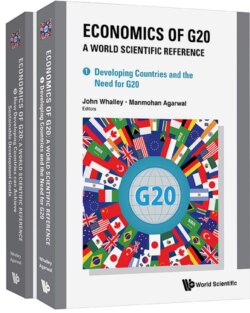Читать книгу Economics of G20 - Группа авторов - Страница 44
На сайте Литреса книга снята с продажи.
The Future of Development and the G20 Work Plan
ОглавлениеFor the G20 to be effective on development issues in the future, it will have to move at some stage to implementation of its recommendations and choose between the options provided by the international agencies. There is the even larger question of whether the G20 largely stays in its coordinating role across international agencies or becomes a more active actor focusing on incremental resource mobilisation for development and stronger global rules. Experience with the G7 is hopefully not a precedent. Despite repeated calls by the G7 to finalise the Doha Round, that has not happened. Studies paint a bleak picture of implementation of the recommendations of the G7.13
Developing countries for now remain dependent on access to OECD economies and growth of their trade with these economies to fuel their growth, part of which is also driven by inward FDIs coming from these economies. The recent slowdown of growth in many developing countries reflects the importance to them of strong growth in developed countries. How to negotiate and then enforce guarantees of openness for OECD markets is therefore a central issue for these countries. Strengthening trade rules by an addition, say, to WTO dispute settlement that now rests solely on bilateral retaliation in case of non-compliance with dispute rulings14 and maybe levying an additional G20 levy in case of non-compliance could be longer term approaches.
Small countries are at a disadvantage on trade issues. If a larger country loses a case and refuses to remove the WTO illegal provision, then the only remedy the small country has is WTO-anchored retaliation, which, as we know from trade theory, will hurt the small country. Neither is it clear how the G20 can deal with the attempt of the current administration of the US to move the terms of trade in their favour nor are the interest of developing countries well served by the current international financial system. When developing countries face a severe balance of payments deficit, they cannot borrow from private markets and loans from the IMF are accompanied by many conditions. This situation has resulted in reserve accumulation as self-insurance and an increasing focus on regional monetary coordination and cooperation.
Economies in Latin America and SSA started to grow rapidly in the couple of years before the financial crisis after a prolonged period of slow growth in the 1980s and 1990s. But these growth rates are still not high enough to substantially reduce poverty15 in these regions, and particularly in SSA. Furthermore, there is little likelihood of these countries achieving their MDG goals without a further substantial acceleration of growth. Achieving 7–8% growth would require investment to be 28–32% of GDP as capital output ratios in the developing world have been about 4 in the past 30 years. Therefore, the challenge for the G20 is not only to reduce the Chinese surplus or the surpluses of other countries but also to devise mechanisms to channel these savings to countries in Latin America and SSA to significantly reduce poverty and other social ills and narrow the gap between low- and high-income countries. Furthermore, substantial investments will be required in SSA in particular to mitigate the effects of climate change.
